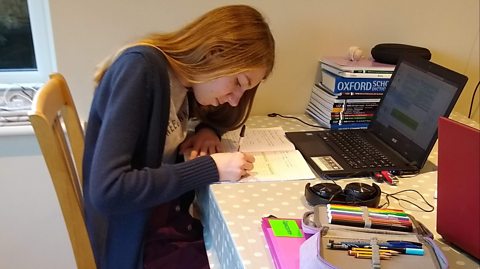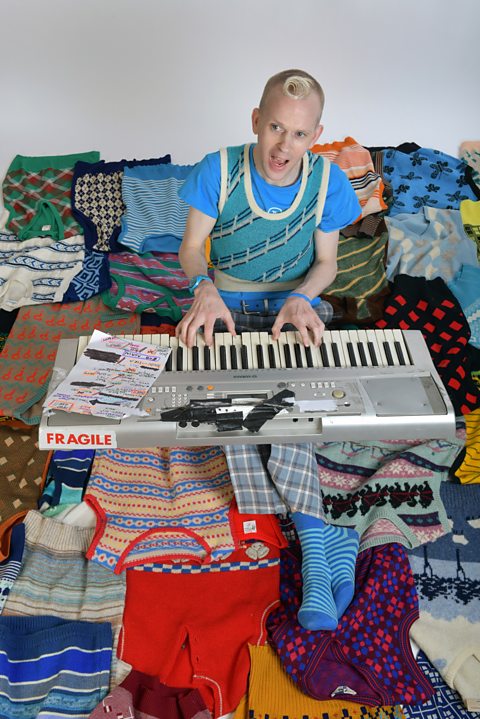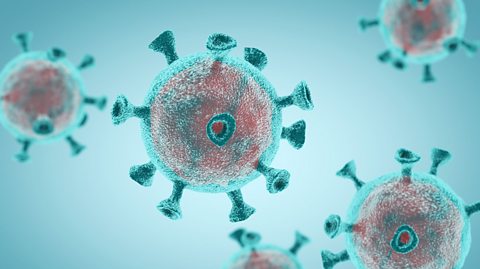Being stuck at home away from people we know and love is tough for everyone right now, but some will be finding it hard in ways you may never have thought.
There are around 700,000 autistic children and adults in the UK, and it affects the way people relate to and interact with the world, and people around them.
Because of this, any changes to routine or immediate surroundings can be hard to cope with.
We spoke to two people about their experiences.
Holly - Year 10 student
Holly (15) is in year 10 and studying for her GCSEs, which have been cancelled this year for students in year 11.
 Image source, Jo & Holly
Image source, Jo & HollyShe wants to be an engineer or work in medicine as she loves science. She has a lot of creative hobbies too, such as playing the piano.
She says that at first she was concerned вҖңworking at home wasnвҖҷt going to be as good as working at school, and it wouldnвҖҷt be as interestingвҖқ.
Without the equipment that school provides, she thought some schoolwork might be quite difficult. On top of all this, even though sheвҖҷs in constant communication with her teachers, a big concern for her was whether or not sheвҖҷd keep on top of everything she needs to know to pass her GCSEs next year.
How HollyвҖҷs routine would change was a big worry. Holly said she felt вҖңstressedвҖқ, and her mum Jo was also concerned:
вҖңKnowing that Holly and her sister (who is also autistic) thrive on routine worried me initially. I worried about how I could educate them at home, what resources to use and if the girls would get bored. Holly really enjoys school, loves to learn and is ambitious; I worried about her losing her passion to learn if her daily routine changed.вҖқ
Tom Purser, Head of Campaigns at the National Autistic Society (NAS) says:
Autistic people will use routineвҖҰ as a way of dealing with a busy and chaotic world which they canвҖҷt always understand, or interpret, or cope with as non-autistic people can.
So, Holly and her mum Jo put the following in place to try and retain structure in their day and keep life as normal as possible:
- Follow the normal weekly lesson timetable as much possible.
- Put all of the normal school equipment on the table like it would be on your desk at school.
- Plan each day in the morning.
- Make time for breaks during the day.
- Go outside for some fresh air, even if just to help hang washing on the line.
Holly says that there are some other positives to her new situation: вҖңI can work at my own pace, spending more time on things I find hard, and spending less time on work I easily understand.
вҖңI can also have a home cooked meal at lunchtime.вҖқ
Sometimes, the little things can make all the difference.
Robert White - Comedian
 Image source, Robert White
Image source, Robert WhiteFor Robert (of BritainвҖҷs Got Talent fame), вҖңliterally everything has changedвҖқ since the lockdown.
Robert relies on gigs to provide an income, and as of right now, theyвҖҷve all had to be postponed.
He says that work is his life, and having it paused at the moment is really tough, for lots of different reasons other than just financial: вҖңI think lots of people who are autistic find it hard to fit in with people so they make their own little niche and the little niche IвҖҷve made for me is comedy.вҖқ
Food shopping has also become difficult. Robert explained that his regular food shop may have looked like stockpiling before the word ever hit the headlines. This is because eating the same food every day is a really useful way of putting less pressure on himself.
вҖңMy life is a case of things which are stable, and things which are variable. Anything thatвҖҷs new or a change I have to think through literally right to the nth degree.
вҖңSo if IвҖҷve worked out that the meal that I eat each day fulfils all the gluten requirements and fulfils all the calorie requirementsвҖҰ it means the next time we canвҖҷt just buy something else and substitute it. Every time you do a change you overthink it.вҖқ
With food and with other things, Robert creates rules to save time and energy. But what if for some reason he canвҖҷt stick to a rule heвҖҷs made?
вҖңI tend to have rules, and rules if rules donвҖҷt work, and so on. So I have fallback options and default options.вҖқ
Tom says you can support autistic people you know by picking things up for them on your food shop (while adhering to social distancing guidelines):
This is a particularly difficult one because we do know that itвҖҷs hard for everyone to get food at the moment or their usual food or levels of food. But I think itвҖҷs aboutвҖҰ checking in and saying while youвҖҷre out doing your shopping, you could pick up one or two of something they eat.
His default option at the moment is that weвҖҷre already living through really challenging times, so donвҖҷt do anything to make it worse. This may seem like really obvious advice to most people, but for Robert itвҖҷs something thatвҖҷs really important for him to stick to, as heвҖҷs had a history of depression and eating disorders that he doesnвҖҷt want to revert back to.
Whilst it might seem hard to find silver linings at the moment, one that Robert is holding onto is that вҖңweвҖҷre all in this togetherвҖқ, waiting to see what will happen next.
He said it was a bit like looking at a distant, active volcano.
вҖңThe volcano is bubbling away in the distance, and weвҖҷve got to wait for it to either destroy the world or to just do a slight fart in our face.
вҖңI think the important thing is that we let it decide and we donвҖҷt destroy our own world before itвҖҷs done its damage.вҖқ
In a nutshell, RobertвҖҷs advice is: вҖңDonвҖҷt be destructive, be productive. Keep smiling. Do what you do. Do what you are.вҖқ

Advice from the National Autistic Society (NAS)
If you have a friend or relative whoвҖҷs autistic, thereвҖҷs three things Tom from the NAS says you can do to help:
- Support: Use available resources to help support people through that difficult processing and change of routine.
- Keep in touch: Let your autistic friends and family know youвҖҷre thinking of them, but donвҖҷt assume they want to be communicated with in the same way you do. Check if video calling, talking on the phone or texting works best for them.
- Help with shopping: As we mentioned before, offering to pick food up when you do your food shop for someone you know whoвҖҷs autistic and has a limited diet can be a lifeline. Remember to follow social distancing rules when you do this though - for example, by leaving the things you've bought outside their door.
School closures: What does it mean for me?
The coronavirus pandemic has led to schools across the UK closing their doors - we explain why and what it means.

Coronavirus: Jargon buster and other things you need to know
We've broken down the key terms you need to know about coronavirus.

What is Valentine's Day like if you're autistic?
We talk to Andy about the romantic holiday.
